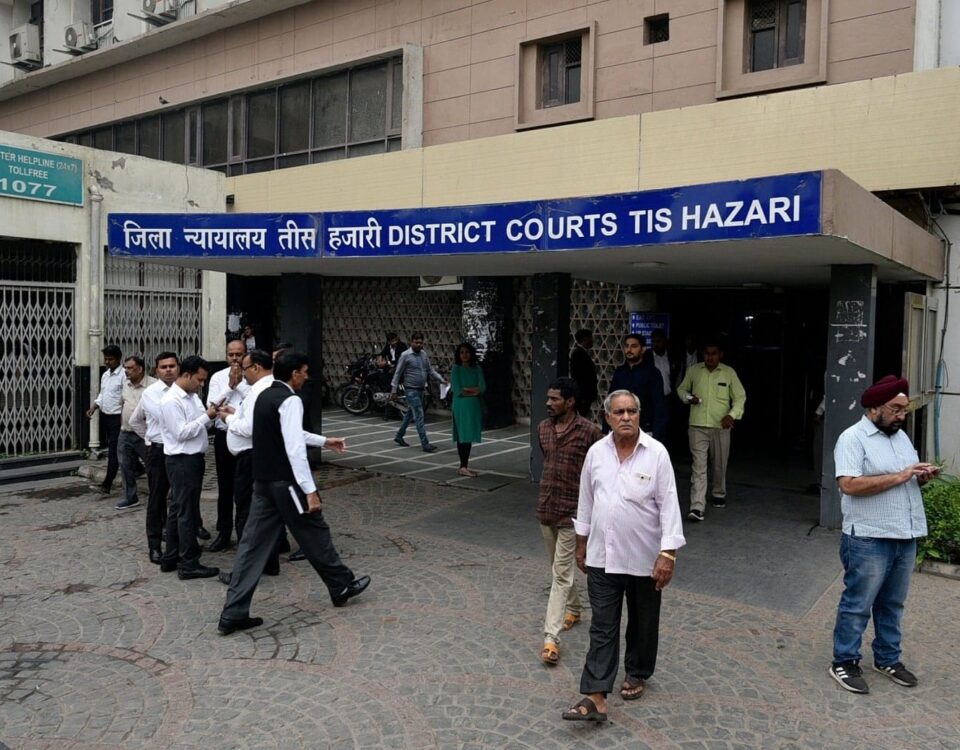Restitution of Conjugal Rights: Understanding Your Legal Rights
Restitution of Conjugal Rights is a legal remedy available under Indian law to bring a spouse back to the marital home if they have left without reasonable cause. It is governed by Section 9 of the Hindu Marriage Act, 1955, and similar provisions exist under other personal laws. This legal provision allows a spouse to seek a court order compelling the other spouse to resume marital cohabitation and fulfill marital obligations. In Delhi NCR, this remedy is commonly sought when one spouse has deserted the other without any lawful justification, and the aggrieved spouse wishes to restore the marital relationship and protect their marital rights effectively. To file a petition for restitution of conjugal rights, the petitioner must establish that the respondent spouse has withdrawn from the marital home without reasonable cause or consent. The petitioner must also demonstrate a sincere intention to resume cohabitation and continue the marriage. The court will assess the circumstances of the separation and determine whether the withdrawal was justified. Valid defenses against such a petition include allegations of cruelty, adultery, or any other substantial reason that justifies the respondent’s refusal to return to the marital home and resume the marital relationship. If the court is satisfied that the respondent has withdrawn without reasonable cause and there is no legal justification for their actions, it may grant a decree for restitution of conjugal rights. This decree legally compels the respondent to resume cohabitation. However, if the respondent continues to refuse, the decree can serve as a ground for divorce after one year, allowing the aggrieved spouse to seek dissolution of the marriage. Given the sensitive nature of these cases, it is crucial to consult an experienced divorce lawyer in Delhi NCR who can provide proper legal guidance, assess the merits of your case, and represent you effectively in court. Our legal team at Top Divorce Lawyer is well-versed in handling restitution of conjugal rights cases, ensuring that your legal rights are protected and your interests are effectively represented throughout the legal process, delivering strong advocacy and comprehensive legal support.

Why Choose Us
- Family Law Experts : We specialize in contested divorces, offering expert legal guidance under the Hindu Marriage Act.
- Strategic Case Approach : Our legal team builds strong, strategic arguments tailored to protect your rights and interests.
- Experienced Legal Team : With years of courtroom experience, we handle complex and high-conflict divorce cases with confidence.
- End-to-End Support : From petition filing to final decree, we manage your entire divorce process professionally and efficiently.
- Confidential & Trustworthy : Your privacy is our priority—we handle your case with complete discretion and legal integrity.
- Client-Centered Service : We listen, understand your situation, and craft solutions that reflect your needs and expectations.
Legal Procedure for Filing Restitution of Conjugal Rights in Delhi NCR
The legal procedure for filing restitution of conjugal rights in Delhi NCR involves several steps that must be followed meticulously to ensure a strong case. The process begins with drafting a petition under Section 9 of the Hindu Marriage Act, 1955, clearly stating that the respondent spouse has withdrawn from the marital relationship without any reasonable cause or consent. The petition should include specific details of the separation, evidence of desertion, and a sincere intent to resume cohabitation. Once the petition is drafted, it must be filed in the family court in the jurisdiction where the couple last resided together or where the respondent currently resides. The court will then issue a notice to the respondent, requiring them to appear and respond to the allegations. During the hearings, both parties will have the opportunity to present their side, along with relevant evidence such as witness statements, letters, or communication records that demonstrate the respondent’s withdrawal from the marital home without justifiable reasons. If the court finds that the petitioner has proven the case and the respondent has no valid defense, it may pass a decree of restitution of conjugal rights, compelling the respondent to return to the marital home and resume cohabitation. However, if the respondent can prove a valid reason for their withdrawal, such as cruelty, neglect, or infidelity, the court may dismiss the petition. In cases where the respondent fails to comply with the decree for over a year, the petitioner can use this as a ground for divorce under Section 13(1A) of the Hindu Marriage Act, 1955. Given the procedural complexities involved, it is essential to seek legal assistance from an experienced divorce lawyer in Delhi NCR who can help draft a strong petition, gather necessary evidence, and effectively represent your interests in court, ensuring that your legal rights are safeguarded throughout the entire process.
Defenses Against Restitution of Conjugal Rights in Delhi NCR
In Delhi NCR, a respondent spouse has the legal right to contest a petition for restitution of conjugal rights by presenting valid defenses that justify their withdrawal from the marital home. The most common defenses include cruelty, adultery, desertion, or a reasonable apprehension of harm. If the respondent can prove that the petitioner subjected them to physical or mental cruelty, the court may dismiss the petition, as no spouse can be legally compelled to return to a harmful or abusive environment. Another defense is proving that the petitioner engaged in adulterous conduct, thereby breaching the marital bond and causing the respondent to leave. In such cases, evidence like messages, photographs, or witness statements can be crucial in establishing the grounds for refusal to resume cohabitation. Additionally, if the respondent can demonstrate that both parties had mutually agreed to live separately, the court may reject the petition, as voluntary separation negates the grounds for restitution. Moreover, if the respondent can prove that the petitioner failed to provide adequate financial support or neglected their marital obligations, the court may consider such neglect as a valid reason for withdrawal. In some cases, the respondent may also claim that the marriage was void or voidable due to factors like fraud, misrepresentation, or lack of consent, further weakening the petitioner’s claim for restitution. Successfully contesting a restitution of conjugal rights petition requires strong evidence and effective legal representation. Consulting with a knowledgeable divorce lawyer in Delhi NCR can help the respondent prepare a compelling defense, gather necessary evidence, and present their case effectively in court, ensuring that their rights and interests are thoroughly protected.
Impact of Restitution of Conjugal Rights on Divorce Proceedings
The impact of restitution of conjugal rights on divorce proceedings in Delhi NCR can be significant, as the outcome of a restitution case can influence subsequent legal actions, including divorce and maintenance claims. If the court grants a decree for restitution of conjugal rights and the respondent fails to comply for a period of one year or more, the petitioner can use this non-compliance as a valid ground for filing for divorce under Section 13(1A) of the Hindu Marriage Act, 1955. The refusal to comply with the decree demonstrates a continued intention to abandon the marital relationship, making it a strong basis for seeking a divorce on grounds of desertion. In such cases, the court views the refusal to comply with the restitution decree as evidence of continued desertion or unwillingness to maintain the marital relationship, thus providing a strong basis for granting a divorce. Moreover, the non-compliance with the restitution decree may also impact the respondent’s claims for maintenance or alimony, as the court may perceive their refusal to return to the marital home as a willful act of desertion. This can significantly influence the court’s decision on financial support, potentially reducing or even denying maintenance claims to the non-compliant spouse. Additionally, in some instances, the respondent may counter the restitution petition by filing a separate petition for divorce, citing mental cruelty, harassment, or irretrievable breakdown of marriage. The court will then assess the merits of both petitions and may consolidate the proceedings to arrive at a comprehensive judgment. If the respondent can present compelling evidence of cruelty, violence, or mistreatment, the court may dismiss the restitution decree and instead focus on the divorce proceedings, thereby altering the legal trajectory of the case. It is also important to note that the court may take into account the reasons for non-compliance with the restitution decree. If the respondent can establish valid reasons for refusing to resume cohabitation, such as domestic violence, adultery, or neglect, the court may dismiss the divorce petition or even set aside the restitution decree. In such cases, the court will thoroughly examine all evidence, including witness statements, medical records, and communication records, to determine whether the respondent’s refusal to return is justified. Moreover, the impact of restitution of conjugal rights extends to property and child custody matters as well.

Home

Contact Us
Enforcement of Restitution of Conjugal Rights Decree in Delhi NCR
Once a court in Delhi NCR issues a decree for restitution of conjugal rights, the respondent is legally obligated to resume marital cohabitation with the petitioner. However, if the respondent fails to comply with the decree without any valid reason, the petitioner has several legal options to enforce the court’s order. The first step is to file an execution petition in the family court, seeking the enforcement of the restitution decree. The court may then issue a notice to the respondent, directing them to comply with the order and resume cohabitation. If the respondent continues to defy the decree, the court may impose financial penalties or fines as a means of enforcing compliance. Additionally, the petitioner can also seek the attachment of the respondent’s property or assets as a coercive measure. This step is particularly relevant when the respondent is financially capable but deliberately refuses to adhere to the court’s order. The court can also issue directives to the local police to ensure that the respondent follows the decree and resumes marital duties. In cases where the respondent’s non-compliance extends for more than a year, the petitioner can use this as a ground to file for divorce under Section 13(1A) of the Hindu Marriage Act, 1955. This provision allows the petitioner to seek dissolution of the marriage based on the respondent’s persistent refusal to comply with the restitution decree. However, it is important to present clear and convincing evidence of the respondent’s non-compliance, such as communication records, witness statements, and previous court notices. Furthermore, if the respondent challenges the decree by claiming that cohabitation is not possible due to cruelty, adultery, or other valid reasons, the court may re-examine the case to assess the authenticity of the claims. This can potentially lead to the modification or revocation of the restitution decree, depending on the evidence presented by both parties. Given the complexities involved in enforcing a restitution of conjugal rights decree, seeking assistance from a competent divorce lawyer in Delhi NCR is essential. A skilled lawyer can guide you through the enforcement process, gather necessary evidence, and effectively represent your case in court, ensuring that your rights are fully protected and the court’s order is enforced in a timely manner.
Contact Us for Restitution of Conjugal Rights Cases in Delhi NCR
If you are seeking legal assistance for a restitution of conjugal rights case in Delhi NCR, our experienced legal team at Top Divorce Lawyer is here to help. We understand that matters involving marital disputes can be emotionally challenging and legally complex. Whether you are looking to file a petition for restitution of conjugal rights or need to contest a decree issued against you, we provide comprehensive legal support tailored to your specific situation.
Our skilled divorce lawyers will assess the merits of your case, gather essential evidence, and represent your interests effectively in court. We are committed to protecting your rights and ensuring that your case is presented strategically to achieve the best possible outcome.
Contact us today for a confidential consultation and take the first step toward resolving your marital dispute effectively.








